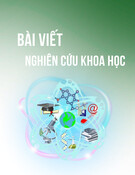
TẠP CHÍ KHOA HỌC - ĐẠI HỌC ĐỒNG NAI, SỐ 35 - 2025 ISSN 2354-1482
24
THE IMPACT OF CHATGPT AND AI ON HIGHER EDUCATION
IN VIETNAM
Nguyen Thi Loan
Dong Nai Technology Universoty
Email: nguyenthiloan@dntu.edu.vn
(Received: 5/3/2025, Revised: 12/4/2025, Accepted for publication: 22/5/2025)
ABSTRACT
This study investigates how ChatGPT and artificial intelligence (AI) affect
Vietnamese higher education. It looks into the effects of AI-powered tools on academic
integrity, individualised learning, and student engagement. This study employs a
mixed-methods approach to evaluate the benefits and challenges of incorporating AI
into higher education by analysing quantitative survey data and qualitative interview
data. The results highlight the need for formal standards to optimise AI's capabilities
while addressing ethical concerns, revealing both benefits and threats.
Từ khóa: ChatGPT, AI in education, higher education, Vietnam, personalized
learning, student engagement, academic integrity
1. Introduction
Artificial intelligence (AI) is
transforming various industries,
including education. Globally, higher
education has embraced ChatGPT, a
sophisticated AI language model. In
Vietnam, colleges are beginning to study
AI’s potential in increasing student
learning experiences. This study intends
to analyse AI’s impact on university
students, faculty members, and
educational results in Vietnam.
AI's introduction into higher education
has completely changed how students
interact with course materials, obtain
information, and get feedback. Students
can get immediate answers to their
questions, clarifications on difficult
concepts, and even inspiration for
research projects with AI-powered
chatbots like ChatGPT. AI has also
facilitated more personalized learning
experiences, allowing students to learn
at their own pace and receive customized
support tailored to their strengths and
academic goals, ensuring they receive
the most relevant and effective support.
Notwithstanding these benefits,
there are a number of issues with the
quick uptake of AI in higher education.
The possible over-reliance on AI tools is
a significant challenge that may impede
students' capacity to acquire critical
thinking and problem-solving abilities.
Furthermore, bias or false information
may occasionally be present in AI-
generated content, raising questions
regarding academic integrity.
Furthermore, because students from
underprivileged backgrounds do not
have the means to efficiently use AI-
powered tools, access to AI in education
may not be equitable.
Examining how AI is influencing
student learning experiences and
educational outcomes is essential in
Vietnam, as higher education is going
through a digital transformation.
Although more and more institutions in
the nation are incorporating AI into their

TẠP CHÍ KHOA HỌC - ĐẠI HỌC ĐỒNG NAI, SỐ 35 - 2025 ISSN 2354-1482
25
curricula, not much research has been
done on the long-term effects of
By investigating how AI, in
particular ChatGPT, is impacting
academic integrity, personalised
learning, and student engagement in
Vietnamese universities, this study aims
to close this gap. This study intends to
present insightful information about the
changing role of AI in higher education
as well as suggestions for its responsible
and efficient application through a
thorough examination of survey data and
qualitative interviews.
1.1. Background of the study
Particularly after the COVID-19
outbreak, Vietnam has been embracing
digital learning resources at a rapid pace.
Discussions concerning the
effectiveness, morality, and long-term
effects of AI-powered programmes in
higher education have been triggered by
their increasing popularity. Creating
well-informed policy requires an
understanding of AI's place in Vietnam's
academic environment.
1.2.Statement of the problem
Even though AI has many
advantages, worries about unequal
access, excessive dependence on AI
tools, and academic dishonesty still
exist. The purpose of this study is to
examine how much ChatGPT and AI
affect academic integrity and student
learning in Vietnam.
1.3. Aims of the study
This study investigates the ways in
which ChatGPT affects student
motivation and engagement as well as
assess AI's contribution to self-
regulation and personalised learning,
moreover it determines the contextual
and cultural elements influencing the
adoption of AI in Vietnamese colleges.
1.4. Research questions
How does ChatGPT enhance student
engagement in higher education?
What are the benefits and drawbacks
of AI-powered personalized learning?
How do Vietnamese students and
faculty perceive AI in education?
1.5. Scope of the study
Vietnamese university students and
professors, especially those studying
technology, business, and social
sciences, are the subject of this study.
Surveys and interviews from a variety of
universities are included in the study.
2. Literature review
2.1. AI in higher education
Numerous studies have examined
the use of AI in higher education,
emphasising its advantages in
automating administrative work,
facilitating individualised instruction,
and raising student engagement
(Selwyn, 2019). Chatbots, virtual tutors,
and adaptive learning platforms are
examples of AI-driven systems that have
revolutionised how students engage with
teachers and educational materials
(Nguyen, 2021). Concerns about data
privacy, moral issues, and possible
biases in AI-generated content, however,
continue to be major obstacles (Brown &
Adler, 2008).
2.2. The role of ChatGPT in academic
support
One of the most well-known AI-
driven language models, ChatGPT, has
been utilised extensively for academic
purposes, such as providing explanations

TẠP CHÍ KHOA HỌC - ĐẠI HỌC ĐỒNG NAI, SỐ 35 - 2025 ISSN 2354-1482
26
for difficult subjects, helping students
with essay writing, and responding to
their questions. According to research,
chatbots driven by AI can improve
student engagement by offering
immediate feedback and individualised
assistance (Huang & Soman, 2013).
However, detractors contend that an
over dependence on ChatGPT may
hinder students' capacity to acquire
autonomous research and critical
thinking abilities (Reeves & Oh, 2008).
2.3. Personalized learning and AI
AI-powered personalised learning
systems modify course materials to meet
the needs of each individual student,
offering tailored learning trajectories
according to preferences and
performance. In his discussion of AI's
function in the connectivist learning
model, Siemens (2005) highlights how
AI makes learning more dynamic and
interactive. Notwithstanding its benefits,
accessibility issues are brought up by
personalised learning since students with
low levels of technology may find it
difficult to utilise AI-powered resources
(Nguyen, 2021).
2.4. Academic integrity and ethical
considerations
The effect of AI on academic
integrity is one of the most hotly
contested topics in education. The
potential for plagiarism in AI-generated
content makes it challenging for teachers
to evaluate students' original work.
Studies have called for stricter
guidelines and ethical policies to
regulate AI usage in academic settings
(Selwyn, 2019). Furthermore, AI biases
may reinforce stereotypes, necessitating
transparency in AI algorithms and their
applications in education.
2.5. Theoretical framework
This study examines AI's function in
higher education using the Self-
Regulated Learning (SRL) model and
the Constructivist Learning Theory. The
concept clarifies how AI encourages
self-directed learning while posing
problems with authenticity and critical
thinking.
Figure 1: Theoretical Framework and AI in higher education in Vietnam

TẠP CHÍ KHOA HỌC - ĐẠI HỌC ĐỒNG NAI, SỐ 35 - 2025 ISSN 2354-1482
27
3. Methodology
3.1. Research design
To gain a comprehensive
understanding of the impact of artificial
intelligence (AI) on higher education,
this study adopts a mixed-methods
approach that integrates both
quantitative and qualitative research
methods. The quantitative component
consists of structured surveys designed
to gather statistical data on student
perceptions, engagement, and learning
outcomes influenced by AI-powered
tools such as ChatGPT. On the
qualitative side, in-depth interviews are
conducted with students and faculty
members to explore their personal
experiences, insights, and concerns
regarding AI’s role in academic settings.
By combining these approaches, this
research aims to provide a holistic
perspective on how AI is shaping the
educational landscape.
3.2. Participants
The study involves a diverse group
of participants, including 500 university
students and 50 faculty members from
leading universities across Vietnam.
These institutions have been selected
based on their academic reputation,
involvement in AI research, and
initiatives aimed at incorporating AI-
driven technologies into higher
education. The participating universities
include: Vietnam National University,
Hanoi; Hanoi University of Science and
Technology; Ho Chi Minh City
University of Technology, University of
Danang – University of Science and
Technology; University of Economics
Ho Chi Minh City, Can Tho University.
Additional universities may be
considered to ensure a broader
representation of perspectives from
different regions in Vietnam. The
selection process prioritizes institutions
that have actively engaged in AI-related
discussions, pilot programs, or policy-
making decisions regarding the
integration of AI in educational
environments.
3.3. Data collection
To ensure reliable and diverse
insights, data is collected through a
combination of online surveys and
structured interviews.
3.3.1. Online surveys
Distributed to university students
and faculty members via digital
platforms to maximize reach and
accessibility.
Includes multiple-choice questions,
Likert-scale ratings, and open-ended
responses to assess AI's influence on
student motivation, engagement, and
learning autonomy.
3.3.2. Structured interviews
Conducted with educators and
students to explore their personal
experiences with AI-powered tools,
challenges they face, and potential
improvements needed.
Questions focus on AI's role in
personalized learning, academic
integrity, self-regulation, and
adaptability to Vietnamese cultural and
educational norms.
Interviews are recorded and
transcribed to facilitate thorough
thematic analysis.
3.4. Data analysis
The study employs a systematic
approach to analyzing both quantitative

TẠP CHÍ KHOA HỌC - ĐẠI HỌC ĐỒNG NAI, SỐ 35 - 2025 ISSN 2354-1482
28
and qualitative data to extract
meaningful patterns and insights.
3.4.1. Quantitative data analysis
Responses from online surveys are
processed using statistical software
(such as SPSS, R, or Python) to generate
descriptive statistics, correlation
analyses, and regression models.
Key indicators include student
engagement levels, AI adoption rates,
and perceived effectiveness of AI-driven
educational tools.
3.4.2. Qualitative data analysis
Interview transcripts are examined
using thematic analysis, allowing for the
identification of recurring themes,
concerns, and opportunities surrounding
AI adoption in higher education.
Coding methods are applied to
categorize responses into themes such as
learning personalization, AI-driven
feedback mechanisms, and ethical
concerns.
By employing this multi-
dimensional analytical framework, the
study aims to provide data-driven
insights that can guide future AI
implementations in Vietnamese
universities while addressing both
benefits and challenges associated with
AI-assisted education.
4. Results
Students’ opinions of AI's
advantages and disadvantages are
depicted in a bar chart. According to
survey results, 40% of students worry
about over-reliance and possible false
information, whereas 75% of students
believe AI is useful for research and
learning.
The study's findings shed important
light on how ChatGPT and AI are being
incorporated into Vietnamese higher
education. Surveys and interviews with
university students and staff from a
range of academic fields were used to get
the data. The results are divided into
three main categories: issues with
academic integrity, individualized
learning experiences, and student
motivation and engagement.
Figure 2: Student perceptions of AI’s benefits and risks
4.1. Student engagement and
motivation According to the study results, 78%
of students said that using ChatGPT and
other AI-powered technologies





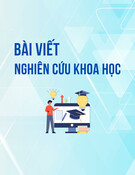



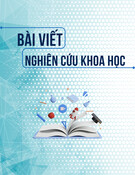
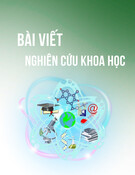
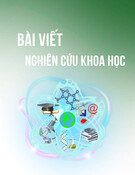

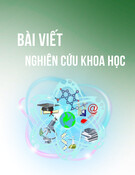


![Định hướng giáo dục STEM trong trường trung học: Tài liệu [chuẩn/mới nhất]](https://cdn.tailieu.vn/images/document/thumbnail/2025/20251124/dbui65015@gmail.com/135x160/25561764038505.jpg)








